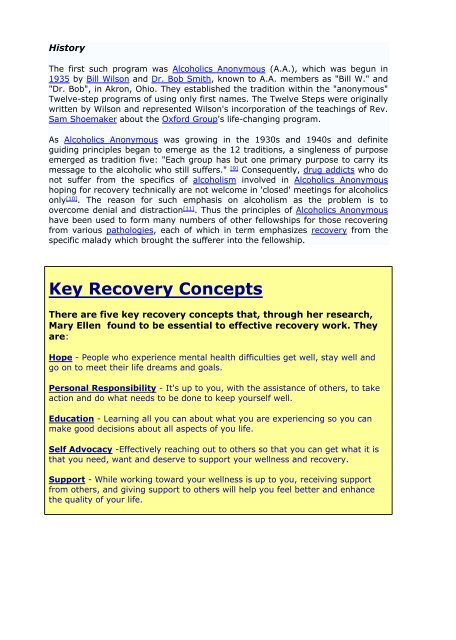personality disorders explained
Antisocial Personality Disorder, Codependence, Narcissism and Borderline
Antisocial Personality Disorder, Codependence, Narcissism and Borderline
You also want an ePaper? Increase the reach of your titles
YUMPU automatically turns print PDFs into web optimized ePapers that Google loves.
History<br />
The first such program was Alcoholics Anonymous (A.A.), which was begun in<br />
1935 by Bill Wilson and Dr. Bob Smith, known to A.A. members as "Bill W." and<br />
"Dr. Bob", in Akron, Ohio. They established the tradition within the "anonymous"<br />
Twelve-step programs of using only first names. The Twelve Steps were originally<br />
written by Wilson and represented Wilson's incorporation of the teachings of Rev.<br />
Sam Shoemaker about the Oxford Group's life-changing program.<br />
As Alcoholics Anonymous was growing in the 1930s and 1940s and definite<br />
guiding principles began to emerge as the 12 traditions, a singleness of purpose<br />
emerged as tradition five: "Each group has but one primary purpose to carry its<br />
message to the alcoholic who still suffers." [9] Consequently, drug addicts who do<br />
not suffer from the specifics of alcoholism involved in Alcoholics Anonymous<br />
hoping for recovery technically are not welcome in 'closed' meetings for alcoholics<br />
only [10] . The reason for such emphasis on alcoholism as the problem is to<br />
overcome denial and distraction [11] . Thus the principles of Alcoholics Anonymous<br />
have been used to form many numbers of other fellowships for those recovering<br />
from various pathologies, each of which in term emphasizes recovery from the<br />
specific malady which brought the sufferer into the fellowship.<br />
Key Recovery Concepts<br />
There are five key recovery concepts that, through her research,<br />
Mary Ellen found to be essential to effective recovery work. They<br />
are:<br />
Hope - People who experience mental health difficulties get well, stay well and<br />
go on to meet their life dreams and goals.<br />
Personal Responsibility - It's up to you, with the assistance of others, to take<br />
action and do what needs to be done to keep yourself well.<br />
Education - Learning all you can about what you are experiencing so you can<br />
make good decisions about all aspects of you life.<br />
Self Advocacy -Effectively reaching out to others so that you can get what it is<br />
that you need, want and deserve to support your wellness and recovery.<br />
Support - While working toward your wellness is up to you, receiving support<br />
from others, and giving support to others will help you feel better and enhance<br />
the quality of your life.

















